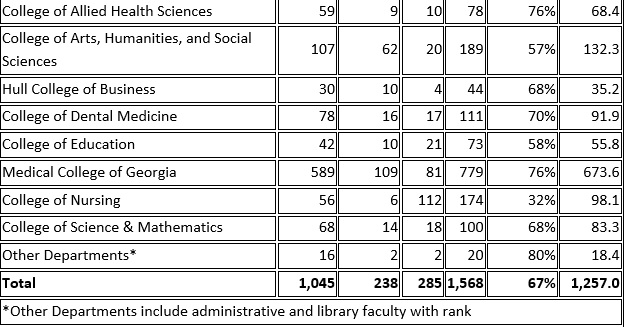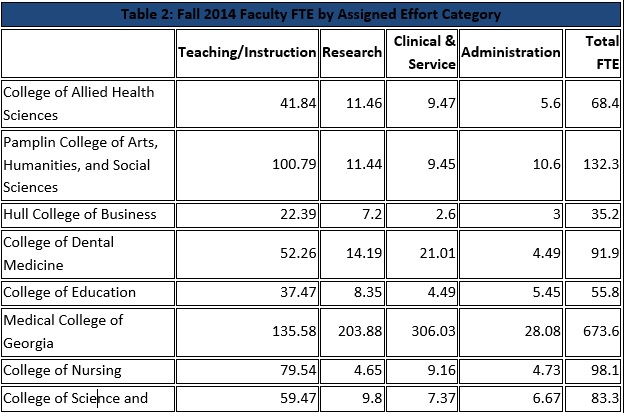A special thanks to all those who submitted questions to Augusta University President Brooks A. Keel during his November town hall presentation. For those questions that couldn’t be addressed in the allotted time, full answers have been provided below.
Q: What is the vision for research on the Summerville Campus? How does this balance with the traditional teaching mission?
A: The mission of most universities could be likened to a three-legged stool inclusive of teaching, research and service. Not every faculty member will have commitments in all three areas. We need faculty who can help service all of our institutional needs, and to fulfill our tripartite mission.
A faculty member is assigned responsibility in one or more of these areas at the time of initial hire, updated as needed during the annual faculty performance evaluation and included as part of the contract renewal process.
Lecturers and instructors are generally assigned 80 to 90 percent teaching/instruction effort, which equates to eight or nine three-hour courses per academic year. The distribution of effort for assistant and associate professors, and professors, is based on the mission of the college, the needs of the students and the interests of the faculty. If the teaching/instruction effort of the full-time faculty within a college or academic program does not meet the student need, effort is either redistributed, or supplemental hires of part-time faculty are made to meet the need.
As a new research institution, we are being intentional about the review and amendment of workload for faculty.
The majority of faculty (1,053 out of 1,575) at Augusta University are full-time faculty. Table 1 below provides the total number of faculty per college, the percent who are full-time, along with the total full-time equivalent (FTE). Overall, each college’s percentage of full-time faculty is adequate to support the mission of the institution and to ensure the quality and integrity of its academic programs. Additional information about each college is included in subsequent sections.
The faculty full-time equivalent (FTE) by effort category is included in Table 2 below, disaggregated by college. The distribution of effort by college is related to each college’s responsibility for providing instruction and participating in research, scholarship and service appropriate to their unit.
Q: Is there a plan to create centers or institutes of excellence that build on interdisciplinary collaborations across campuses? How will faculty maintain such centers in the midst of teaching, research and clinical responsibilities?
A: While we have a Centers & Institutes policy, we want to be judicious with the creation of new administrative units that require resources that do not directly impact teaching, research and/or service. We are fully committed to interdisciplinary collaborations and welcome the sharing of innovative ideas by faculty, with colleagues, chairs and deans.
Q: How can we best engage students at remote campuses with the rebranding of Augusta University?
A: The engagement of all of the constituents within our university community has been a priority since the name change was announced. We have tried to provide opportunities for input and communication to everyone, including those on remote campuses, through online surveys, our au.gru.edu website, emails and the most recent town hall.
Going forward, we will continue to engage all campuses through a combination of face-to-face visits, web, email and Skype.
Q: What criteria will you use to judge your effectiveness as the leader of our university and health system?
A: In my town hall presentation, I described professional aspirations related to increased enrollment, improved retention and graduation rates for undergraduates, increased research funding, increased patient satisfaction in our clinical enterprise, and an enhanced reputation for the state of Georgia’s only public academic health center. I hope to make progress toward our targets in all of those areas.
Q: What does a leader without a medical degree mean for the health system?
A: One could also ask the opposite question, “How would a president with a medical degree impact the lives of students and faculty on the Summerville Campus?” First, Augusta University is not just a clinical operation, nor is it just an undergraduate university. The consolidation of ASU and GHSU produced a comprehensive research university, one that requires a president with diverse expertise. Second, even though I do not have a medical degree, I have spent more than 16 years on a clinical campus at the University of Kansas School of Medicine-Wichita, where I rose through the ranks from assistant professor to professor (with tenure) and was awarded an endowed chair in obstetrics and gynecology. I also served as associate dean for research on that campus, and as director of an accredited clinical laboratory where I still maintain certification as a clinical laboratory director.
Q: What will transparent communication look like in your presidency?
A: I routinely meet with the Faculty Senate and with the Senate leadership. I also rely on the provost and, through her, the deans, chairs and directors to maintain open communication lines. I try to be visible and accessible as much as I can and welcome comments and suggestions. There are indeed some instances in which open, transparent communication is not possible, such as in personnel decisions, negotiating land and real estate acquisition and other areas covered by external regulations.
Q: What are your thoughts on shared governance as it relates to university/college/department decision-making?
A: I believe that many of the academic decisions related to the university such as curriculum development, student success, student recruitment, and promotion and tenure policies should originate at the department level. Chairs have an obligation to make sure that information flows from the provost and deans to the faculty, and that concerns expressed by the faculty are registered with the deans.
Q: How can the University Senate work more closely with you in areas such as student admissions policies?
A: As I shared in the town hall, I provided a briefing on student admissions to the Board of Regents on Nov. 10. We are not making a significant change in our admissions policy. Instead, in an effort to be fiscally responsible, we are extending the time over which we increase our minimum admissions standards, thus bringing them into alignment with the other research universities in the USG. I would encourage anyone who has concerns about this issue to the Chronicle of Higher Education op-ed.
Q: Do we still have an Office of Academic Affairs for the Summerville Campus?
A: We have an Office of Academic and Faculty Affairs located on the Summerville Campus. It serves the entire university, but has many initiatives specifically targeted to Summerville colleges.
Q: Other universities have a dean or vice president of faculty. Why don’t we?
A: While we might not have a position with that exact title, we do have a vice president of academic & faculty affairs who serves in many important roles related to the recruitment, support, development, advancement and retention of faculty. This position was established with very specific responsibilities including the management of the Center for Faculty Development and Teaching Excellence, along with the Faculty Affairs services.
Q: Why is there no faculty representative for the Goldwater Scholarship?
A: Sam Robinson has just been named to that position.
Q: Why is the university not involved in the USG STEM initiative?
A: The deans from the College of Science and Mathematics and the College of Education are working together to create a STEM Education Center that will explore STEM education funding opportunities including the USG STEM initiative.
Q: Will the marketing of our academic programs be improved on the website?
A: Our website faces a number of strategic challenges and we share your concerns about the communication of our academic programs. The Division of Communications and Marketing will introduce a new website design in the spring. Following the rollout, there will continue to be a great deal of work with colleges, schools and individual departments to address specific pages.
Work has begun to develop templates and protocols with colleges and departments. For specific questions, contact Dr. Karla Leeper, EVP for strategic communication, at kleeper@gru.edu.
Q: How will you support and grow the Partnership Campus in Athens?
A: There is a strategic plan for the Medical Partnership Campus in Athens. Dr. Peter Buckley, dean of the Medical College of Georgia, is planning a town hall for students on the Athens campus to provide an update on the plan and what’s ahead.
Q: How will you retain faculty?
A: Faculty retention is a top priority and everyone’s responsibility. We all contribute to the environment and culture of our university, which serves to attract students and faculty. Additionally, there are targeted support services for faculty in the areas of teaching, research and scholarship through programs offered by the Center for Faculty Development and Teaching Excellence, Office of Leadership Development and the Senior Vice President for Research.
Q: With college costs rising, how will you keep tuition affordable for students?
A: Tuition rates are set by the University System of Georgia Board of Regents. However, both the board and the university are committed to affordable education.
All fee increases are vetted through a Mandatory Fee Committee composed of Augusta University undergraduate and graduate students. The committee is presented with recommendations from representatives of fee-based services such as Student Health, Transportation and Athletics, and then votes on which, if any, of the increases will be recommended for consideration by the president. Once the president approves a fee increase, the recommendation is sent to the BOR for consideration.
Q: Will we continue to use outside consultants?
A: Consultants are used to augment our in-house expertise.
Q: Will the name of the health system change?
A: The name of the health system and medical center are determined by their respective boards. We hope to have more information by the end of January.
Q: When will the Master Plan for the clinical enterprise be available?
A: While the master plan for research and academic space has been completed, we are just beginning the process or assessing the clinical space needs.
Q: How do you see institutional racism and other forms of structural biases impacting student success at Augusta University? What have you done to address these issues in the past?
A: As an educator, I have long been committed to enhancing diversity. I look forward to creating an institution that fully embodies our value of inclusivity, reflected in diversity, equality, fairness, impartiality and respect.
Augusta University has implemented processes to address and prevent institutional racism, including full infusion of equity and inclusion efforts in the Division of Academic Planning and Strategic Initiatives; comprehensive review of policies, institutional statements and strategic plans; climate surveys; and inclusive excellence in recruitment.
Q: Will parking spaces be offered near college buildings and clinical facilities?
A: We are currently developing a plan to improve parking. We also recognize the demand for additional shuttles in the evening hours and between campuses. We anticipate improvements as early as August.
 Augusta University
Augusta University








